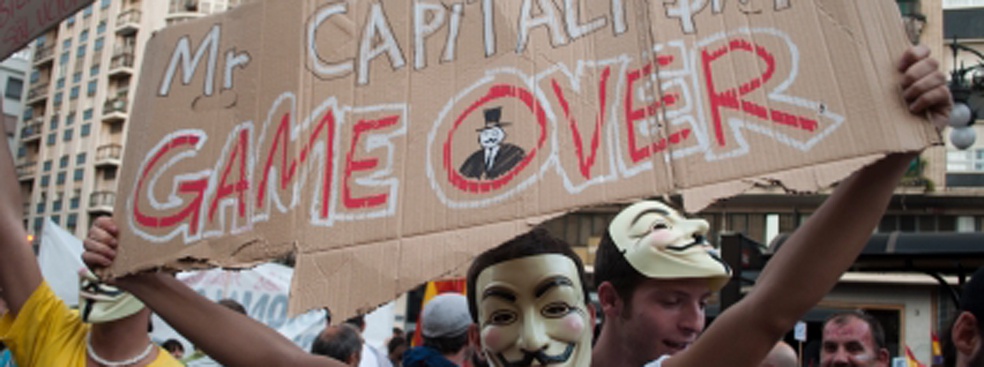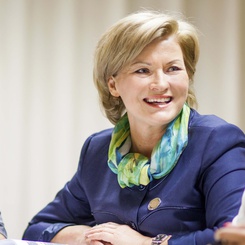Today’s uncertain economic climate would appear to call free-market capitalism, or neoliberalism, into question. Has this ideology had its time in the sun and must it now make way for alternative economic theories? Marie-Laure Djelic believes this is still an open question. Indeed, neoliberalism has strong, deep-set roots that stretch back more than sixty years – changing course will not be easy.
An economic ideology developed through years of organized, intellectual reflection
To tell the story of neoliberal ideology, we must go back to the Second World War – and more specifically by the post-war period – which had reaffirmed a strong role for the state in many Western nations. As professor Djelic explains, “a scattered group of intellectuals had been guarding the ideas of liberalism and free market since before the war. However, the evolutions they observed during the immediate post-war period, including increased central planning and the nationalization of several, formerly private institutions, fostered in them a sense of fear and spurred them into action.”
Friedrich Hayek, the Austrian economist and philosopher, became a leader for this intellectual movement centered on the defense of individualism and classical liberalism. He published in 1944 The Road to Serfdom, where he expressed his view that Western democratic and capitalist nations were progressively abandoning “that freedom in economic affairs without which personal and political freedom has never existed in the past” (Hayek 1944: 16). The road towards welfare states, planning and a strong role for the state was a road towards socialism, or what he went so far as to call serfdom. This book sparked an intellectual debate on the role of states and the freedom of markets.
To encourage the debate and to give a voice to like-minded intellectuals across Western Europe and North America, Hayek organized in 1947 a meeting in the Swiss town of Mont Pelerin. There were representatives from different countries and different traditions of liberal thought. Three intellectual streams stood out. The Austrian school, mostly comprised of expatriated Austrians, was a group with a strong liberal tradition, influenced by such thinkers as Ludwig von Mises who was libertarian in his way of thinking. The Chicago school, a node of liberalism even before the war centered in the Economics Department at the University of Chicago, was represented by established economists like Frank Knight as well as up-and-coming intellectuals like Milton Friedman and George J. Stigler. The German ordoliberals had been fighting for survival in a pre-war, very state controlled nazy Germany and were suddenly now involved in the transformation of post-war Germany.
At the end of the meeting, this group of 39 individuals decided to formalize their intellectual community by legally setting up the Mont Pelerin Society (MPS) – named after the location of this first meeting. The MPS would become in the following years the center and the core for neoliberal debate. Members didn’t always agree, but their heated debates created an intellectual incubator for neoliberal ideology. This was important because Hayek believed that ‘ideas ruled the world.’
In this sense, the Mont Pelerin Society inscribed itself in a structured strategy. As Professor Djelic explains, “Hayek wanted to do what the socialists had done at the end of the 19th century – an idea he elaborated in 1949 in a little known but extremely powerful article The Intellectuals and Socialism – which was to organize a circular ideological organization that would ensure both the formalization and the transmission and wide diffusion of a new ideology.”
“At the centre of this organization is a relatively small core of utopian thinkers – for neoliberals this was the Mont Pelerin Society. Somewhat detached, this core dreams a world that doesn’t exist and isn’t likely to exist soon, but they are carrying the flame, as it were. Around this centre is a second layer of organized action that should emerge and densify progressively through time – journalists, professors, artists and policy makers – who connect the core utopian thinkers with reality. He called these ‘the second hand dealers of ideas.’ They actively transform reality by writing articles, influencing policy makers, teaching and shaping future generations. This is what Hayek projected as a path to achieve intellectual influence already in his 1949” (Hayek 1949).
For the neoliberals, artists eventually played an important role in the diffusion of ideas, and one in particular: Russian-American novelist and philosopher Ayn Rand. She had lived through the Russian Revolution and seen her middle class family loose everything, which drove her to become powerfully anti-communist. Once established in the US, Rand sought to communicate her philosophy – what she called Objectivism – through her immensely successful novels. In particular, Atlas Shrugged and The Fountainhead developed characters that felt overwhelmed by a collective, which took over their individuality. Rand’s Objectivism was far-reaching, influencing directly the likes of Alan Greenspan who would serve as Chairman of the Federal Reserve for over 20 years. As Greenspan himself made it clear in his autobiography The Age of Turbulence, “Rand's Collective became my first social circle outside the university and the economics profession…I found the broad philosophy of unfettered market competition compelling as I do to this day… Ayn Rand and I remained close until she died in 1982, and I'm grateful for the influence she had on my life; I was intellectually limited until I met her.”
The intellectual success of the neoliberal movement became particularly evident in the late 1970s with an explosion of liberal think tanks, where there had been virtually none before. “Today there are more than 400 around the world,” adds Professor Djelic. “This is really an impressive expansion in just 60 some odd years… This expansion was coupled with the gradual institutionalization of neoliberalism particularly in Universities and Economics Departments.”
The economic crisis of 1973: A window of opportunity for neoliberalism
The economic crisis that peaked in 1973 was reinterpreted by many as the failure of Keynesian economics, which had advocated government policy intervention. This was a window of opportunity for those proposing alternative economic theories. The neoliberals had been preparing for years and the opportunity was easily seized.
The first country where liberalism effectively became policy was Chile. In 1973, with the assassination of Marxist President Salvador Allende, General Augusto Pinochet rose to power and brought in young economists who had been trained by Friedman and others in the Economics Department of the University of Chicago. Milton Friedman himself went to Chile several times as a “consultant”.
Friedman’s theories were also extremely influential on two pillars of neoliberal policy: Ronald Reagan and Margaret Thatcher, who both ushered in free-market capitalism on both sides of the Atlantic.
While Friedman had been personal advisor to Reagan as Governor of California, Thatcher herself declared that Friedman had been a major influence on her through the Institute of Economic Affairs, a think tank created in England in 1955 to spread the ideas of Hayek and of the Mont Pelerin Society. “These evolutions highlight the extent to which the Chicago School, as part of the Mont Pelerin Society, had proven their effectiveness in growing neoliberal ideology,” explains Professor Djelic. “Friedman was a clear and direct link between these actors and early experiments with supply side economics.”
Neoliberal policies cemented by a trickle-down effect
“Since the 1980s these ideas have cemented themselves as neoliberal policies have found their way into institutions like the International Monetary Fund (IMF), the World Bank and the US treasury Department – a Washington Consensus around this idea to get rid of Keynesianism and move toward a neo-liberal perspective on the economy. Plus, with the IMF and the World Bank involved, many other countries were told to apply these kinds of neo-liberal policies.”
This evolution was furthermore marked by the increasingly important political role played by economists. With the rise of neoliberalism in the 1980s, economists become a key source of policy advice and eventually took on important roles in many different realms of government: Economists became policy advisors, finance ministers and governors of central banks. “If you look at post-communist Eastern Europe,” adds Professor Djelic, “you see that a lot of the younger generation of finance ministers have either a PHD in economics or an MBA from American or British institutions. This is, with historical hindsight, a new phenomenon.”
In the 1990s and 2000s, what became known as New Public Management illustrated perfectly the extent to which neoliberal ideology had been integrated into the mainstream. She explains, “together with supply side economics you also have this idea that many things formerly done by the state should in fact be privatized. Things like telecoms, banking sector, to the point where in the US even part of the military function is outsourced to private actors or in England the management of prisons.”
“This phenomenon is connected with the idea of New Public Management which amounts to the managerialisation of public sector activity. President Nicolas Sarkozy for example, by imposing objectives on the police, was clearly using New Public Management tools. This is one very concrete example of how these ideas trickle down, even into those parts of public service that have not been privatized – policing, education and healthcare.”
The financial crisis of 2009: a window of opportunity for an alternative approach?
Is this new crisis putting into question the legitimacy of neoliberal ideas? Is it doing to liberalism what the 70s did to Keynesianism? This is still an open question.
“In the 70S and 80s, a number of Nobel prizes went to neoliberals and legitimized their intellectual dominance, or at least the importance of the ideas. Today, Nobel prizes are more likely to go to critics of neoliberalism. But while critics of neoliberalism are in the process of gaining this new legitimacy, the shift really only started about 4 or 5 years ago with the onset of the crisis. Joseph Stiglitz is one of the forerunners who in 2007 started moving in this direction.”
What is clear for Professor Djelic is that an alternative set of ideas haven’t seen the same kind of preparatory groundwork as neoliberalism had by the time the 1973 crisis created its window of opportunity. At this point, the liberals had been working for two decades, creating a strong intellectual and institutional base. For an alternative ideology to take its place, a great deal of work will lay ahead.









